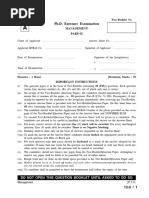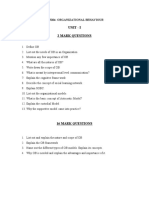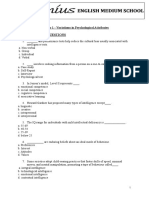100%(2)100% found this document useful (2 votes)
7K viewsPersonality Development Question Bank
This document contains a question bank on the topic of personality development with 58 questions covering various concepts related to personality such as SWOT analysis, mind maps, listening skills, body language, attitudes, habits, success and failure, interviews, relationships, self-esteem, communication skills, and theories of personality development by Sigmund Freud. The questions probe explanations of key terms and concepts in personality development as well as factors that influence personality formation and strategies for enhancing personality.
Uploaded by
viraaj pawarCopyright
© © All Rights Reserved
Available Formats
Download as PDF, TXT or read online on Scribd
100%(2)100% found this document useful (2 votes)
7K viewsPersonality Development Question Bank
This document contains a question bank on the topic of personality development with 58 questions covering various concepts related to personality such as SWOT analysis, mind maps, listening skills, body language, attitudes, habits, success and failure, interviews, relationships, self-esteem, communication skills, and theories of personality development by Sigmund Freud. The questions probe explanations of key terms and concepts in personality development as well as factors that influence personality formation and strategies for enhancing personality.
Uploaded by
viraaj pawarCopyright
© © All Rights Reserved
Available Formats
Download as PDF, TXT or read online on Scribd
You are on page 1/ 2
Personality Development Question Bank.
1. What is SWOT analysis?
2. What is Superego?
3. Explain Zeal and Passion Building.
4. Self-Assessment.
5. Explain the elements of a Mind map.
6. Listening skills
7. Explain STAR Analysis.
8. Mass Media builds personality, explain.
9. Being pro-active
10. What is Group Discussion?
11. What is Body language
12. What is a Habit?
13. Intentional listening
14. What is a Mind map?
15. Prioritizing
16. Self-Introduction.
17. Explain the meaning of Attitude.
18. Projecting Positive Body Language
19. STAR analysis
20. Success and failure
21. What is a Habit?
22. Explain in detail how do Sibling Relations affect in developing one’s personality?
23. Define the term Attitude. Explain the factors that determine attitude
24. Define Personality Development. Explain Sigmund Freud’s theory
25. Definition of Personality.
26. Types of Interviews.
27. Give examples of Personality Traits.
28. Explain in detail the habit of “Sharpening your saw”.
29. Things to keep in mind in a Personal Interview.
30. Distinguish between Real Success and Imaginative Success.
31. Why is it important to Think Win-Win
32. Define self-esteem. Explain in brief significance of self-esteem.
33. Format of a resume.
34. Individual Development Plan.
35. Define term ‘Failure’. Explain the reason of failure
36. Explain Synergize
37. Impact of Mass Media on personality
38. Managing Egoistic Insult.
39. Strategies of gaining power and influence
40. Benefits of Positive Attitude.
41. Nature vs Nurture.
42. Why is a Resume important?
43. How can one enhance personality through effective communication.
44. Consequences of Negative Attitude.
45. Write a note on telephone etiquettes.
46. What is introspection? Explain in detail the self-introspection skills.
47. Explain in detail the habit of “Begin with the end in mind”.
48. Explain competency mapping.
49. How can you Build positive relationships.
50. List the characteristics of personality.
51. Explain the big five model.
52. Define self-esteem. Explain in brief significance of self-esteem.
53. Define Self-Appraisal. Explain in detail tips for effective self-appraisal.
54. Explain the concept of ID, EGO and SUPER EGO as described by Sigmund Freud.
55. Explain the habit-“Seek First to Understand, Then to Be Understood”.
56. Define Personality Development. Explain in detail how do peer groups and public
relations affect in developing one’s personality.
57. What do you mean by Self-Development? Explain in detail the process of self-
development.
58. Define Personality Trait. Explain ways of developing positive personality traits.
You might also like
- Question Paper PHD Entrance Management (Part II)100% (1)Question Paper PHD Entrance Management (Part II)12 pages
- Personality Development and Soft Skills: Barun K Mitra0% (2)Personality Development and Soft Skills: Barun K Mitra34 pages
- Moving Quiz - Chapter 1 and 2 Positive Psychology100% (1)Moving Quiz - Chapter 1 and 2 Positive Psychology28 pages
- Psychology Question Bank 2021 (Paper 3) (1st Term)100% (3)Psychology Question Bank 2021 (Paper 3) (1st Term)6 pages
- Chapter 3 Quiz: The Biological Basis of Behavior100% (1)Chapter 3 Quiz: The Biological Basis of Behavior24 pages
- Needs, Interests & Problems of Adolescence100% (2)Needs, Interests & Problems of Adolescence13 pages
- Unit - I 2 Mark Questions: Ba9204-Organizational Behaviour60% (5)Unit - I 2 Mark Questions: Ba9204-Organizational Behaviour6 pages
- S. B. Patil Institute of Management: Question Bank MBA-II SemNo ratings yetS. B. Patil Institute of Management: Question Bank MBA-II Sem2 pages
- BBA 202 - Business Communication - PPT - Unit 1 & 2No ratings yetBBA 202 - Business Communication - PPT - Unit 1 & 249 pages
- Business Communication - Unit Wise Important Questions100% (2)Business Communication - Unit Wise Important Questions3 pages
- Madurai Institute of Social Sciences Objectives Type Questions and Answers Life SkillsNo ratings yetMadurai Institute of Social Sciences Objectives Type Questions and Answers Life Skills8 pages
- Bangalore University Business Ethics Past 5 Years Question Paers (2015-2019)100% (1)Bangalore University Business Ethics Past 5 Years Question Paers (2015-2019)3 pages
- BBA 1st Sem Personality Development and Grooming Unit I & II Study NotesNo ratings yetBBA 1st Sem Personality Development and Grooming Unit I & II Study Notes63 pages
- Psychology Question Bank - 440 MCQs On - Motivation and Emotions - Part 4No ratings yetPsychology Question Bank - 440 MCQs On - Motivation and Emotions - Part 443 pages
- Psychology (037) Class Xii Pre Board Question Paper Term II 2021-22 Time - 2 Hours Max Marks - 35No ratings yetPsychology (037) Class Xii Pre Board Question Paper Term II 2021-22 Time - 2 Hours Max Marks - 353 pages
- PERSONAL GROWTH AND INTERPERSONAL EFFECTIVENESS AssignmentNo ratings yetPERSONAL GROWTH AND INTERPERSONAL EFFECTIVENESS Assignment1 page
- 603356286-Personality-Development-Question-BankNo ratings yet603356286-Personality-Development-Question-Bank2 pages
- Phototherapy As The Tool of Emotional Identification Development of AdolescentsNo ratings yetPhototherapy As The Tool of Emotional Identification Development of Adolescents10 pages
- Social Work Dictionary From University of Montana67% (3)Social Work Dictionary From University of Montana80 pages
- Bodies under siege self mutilation and body modification in culture and psychiatry 3rd Edition Armando R. Favazza 2024 Scribd Download100% (1)Bodies under siege self mutilation and body modification in culture and psychiatry 3rd Edition Armando R. Favazza 2024 Scribd Download51 pages
- T2 S 857 Year 5 Animals Including Humans End of Unit Assessment Ver 1100% (1)T2 S 857 Year 5 Animals Including Humans End of Unit Assessment Ver 17 pages
- Mental Health Presentation Autism Spectrum Disorder 3No ratings yetMental Health Presentation Autism Spectrum Disorder 347 pages
- Primatology Guide: 1. Books 2. Ebooks 3. Ejournals 4. Videos 5. Web ResourcesNo ratings yetPrimatology Guide: 1. Books 2. Ebooks 3. Ejournals 4. Videos 5. Web Resources9 pages
- Green Pink Colorful Mental Health Trifold BrochureNo ratings yetGreen Pink Colorful Mental Health Trifold Brochure2 pages
- Psychology PSY1011 PSY1022 A Custom Edition Mujumdar Download PDFNo ratings yetPsychology PSY1011 PSY1022 A Custom Edition Mujumdar Download PDF53 pages
- The Conceptual Process of 2 Becoming 1 (Repaired)No ratings yetThe Conceptual Process of 2 Becoming 1 (Repaired)6 pages
- Programme - IPA 54th Congress and 28th IPSO Conference Lisbon 2025No ratings yetProgramme - IPA 54th Congress and 28th IPSO Conference Lisbon 202561 pages
- The Connor-Davidson Resilience Scale (CD-RISC) - Testing The Invariance of A Uni-Dimensional Resilience Measure That Is Independent of Positive and Negative AffectNo ratings yetThe Connor-Davidson Resilience Scale (CD-RISC) - Testing The Invariance of A Uni-Dimensional Resilience Measure That Is Independent of Positive and Negative Affect5 pages
- Ibarra - 1993 - Personal Networks of Women and Minorities in ManagNo ratings yetIbarra - 1993 - Personal Networks of Women and Minorities in Manag33 pages
- Durbin Hicks 2014 Personality and Psychopathology A Stagnant Field in Need of DevelopmentNo ratings yetDurbin Hicks 2014 Personality and Psychopathology A Stagnant Field in Need of Development25 pages

























































































